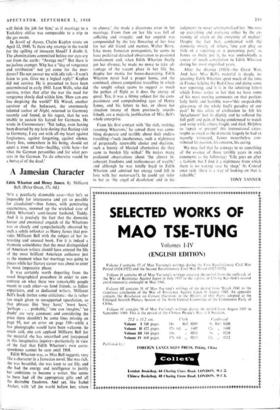A Jamesian Character
'Ws a peculiarly damnable case—that he's so impossible for intercourse and yet so possible for circulation'—thus James, with penetrating succinctness, summed up the wretched case of Edith Wharton's semi-insane husband, Teddy. And it is precisely the fact that the domestic horror and emotional anguish of the Whartons was so closely and sympathetically observed by such a subtle onlooker as Henry James that pro- vides Millicent Bell with the subject of her in- teresting and unusual book. For it is indeed a dramatic coincidence that the most distinguished of American writers should have entered the life of the most brilliant American authoress just as the moment when her marriage was going to pieces while her literary career was about to enter its most impressive phase.
It was certainly worth departing from the usual biographical procedure in order to con- centrate on what these two remarkable people meant to each other—as fond friends, as fellow expatriates, and as dedicated writers. Millicent Bell's book invites some criticisms: she is rather too much given to unsupported speculation, so that phrases like 'may have,' must have,' 'perhaps . . . probably,' one can imagine,' 'no doubt' are very common; and considering the price there shouldn't be some lines missing on page 93, nor an error on page 310—while a few photographs would have been welcome. So much said, one can applaud Millicent Bell for the material she has unearthed and juxtaposed in this imaginative inquiry—particularly in view of the fact that Edith Wharton's own corre- spondence cannot be seen until 1968.
Edith Wharton was, as Miss Bell suggests, very like a character in a Jamesian novel. She was rich, she was beautiful, she was keen to see life, and she had the energy and intelligence to justify her ambitions to become a writer. She seems to have had allY the appropriate gifts and all the desirable freedoms. And yet, like Isabel Archer, with 'all the world . before her, where
to choose,' she made a disastrous error in her marriage. From then on her life was full of suffering , and struggle; and her anguish was compounded by the late flowering of her love for her old friend and mentor, Walter Berry. Like many Jamesian protagonists, he seems to have preferred detached observation to passional involvement and, when Edith Wharton finally got her divorce, he made no move to take ad- vantage of the vacant place in her life. So, despite her mania for house-decorating, Edith Wharton never had a proper home, and the continual, almost compulsive travelling in which she sought solace seems to suggest as much the pathos of flight as it does the enemy of quest. Yes, it was a fitting subject for the com- passionate and comprehending eyes of Henry James, and his letters to her, or about her situation (many of them previously unpub- lished), are a majestic justification of Miss Bell's whole enterprise.
From his first contact with 'the rich, rushing, ravening Whartons,' he sensed there was some- thing desperate and terrible about their endless travelling—`such incoherence, such a nightmare of perpetually renewable choice and decision, such a luxury of bloated alternatives do they seem to burden life withal.' He makes many profound observations about 'the almost in- coherent freedoms and restlessnesses of wealth,' and although he was totally loyal to Edith Wharton and admired her energy (and fell in love with her motor-car!), he could yet refer to her as 'the angel of desolation' and in his
judgments he never sentimentalised her. 'She uses up everything and everyone either by the ex- tremity of strain or the extremity of neglect.' Despite the fact that, confronted with the domestic misery of others, 'one can play so little of a repairing or a preventing part,' as James so finely put it, he was undoubtedly a source of much consolation to Edith Wharton during her most anguished years.
After the dk orce (1 913)—the Great War. And here Miss Bell's material is deeply in- teresting. Edith Wharton spent much of the time in France helping the Red Cross and doing some war reporting, and it is in the admiring letters which James writes to her that we have some of his most moving comments on that particu- larly futile and horrible war—`this unspeakable give-away of the whole fool's paradise of our past.' In this crisis of civilisation he felt his 'detachment' lost its dignity and he suffered the full guilt and pain of being condemned to watch and write while others fought and died. Helpless to 'repair or prevent' this international catas- trophe as much as the domestic tragedy he had so recently witnessed, James nevertheless con- tributed his passion, his concern, his caring.
We may feel that he conveys to us something of the essence of those terrible years in such comments as the following: 'Life goes on after a fashion, but I find it a nightmare from which there is no waking save by sleep.' As Conrad once said, 'there is a way of looking on that is valuable.'
TONY TANNER






























 Previous page
Previous page